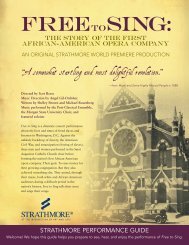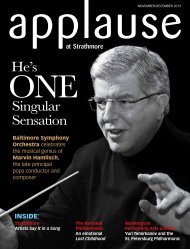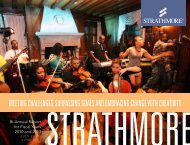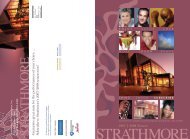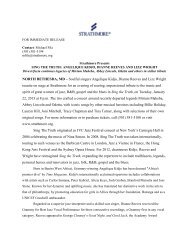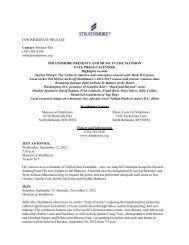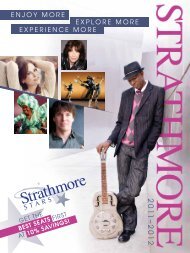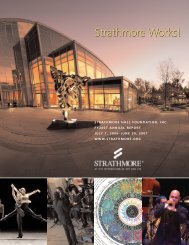The Bach Sinfonia: Purcell's King Arthur in Concert - Strathmore
The Bach Sinfonia: Purcell's King Arthur in Concert - Strathmore
The Bach Sinfonia: Purcell's King Arthur in Concert - Strathmore
Create successful ePaper yourself
Turn your PDF publications into a flip-book with our unique Google optimized e-Paper software.
Saturday, May 9, 2009, 8 p.m.<br />
<strong>Strathmore</strong><br />
PRESENTS<br />
<strong>The</strong> <strong>Bach</strong> <strong>S<strong>in</strong>fonia</strong>:<br />
Purcell’s <strong>K<strong>in</strong>g</strong> <strong>Arthur</strong> <strong>in</strong> <strong>Concert</strong><br />
<strong>K<strong>in</strong>g</strong> <strong>Arthur</strong>; or <strong>The</strong> British Worthy<br />
Semi opera <strong>in</strong> five acts<br />
Libretto by John Dryden<br />
Excerpted narration with l<strong>in</strong>k<strong>in</strong>g passages <strong>in</strong> verse by Laurence Senelick<br />
Music by Henry Purcell<br />
Yulia Van Doren, soprano<br />
Barbara Holl<strong>in</strong>shead, alto<br />
Craig Lemm<strong>in</strong>g, tenor<br />
David Newman, bass<br />
Karl Kippola, actor<br />
<strong>The</strong> <strong>Bach</strong> <strong>S<strong>in</strong>fonia</strong><br />
<strong>The</strong> <strong>Bach</strong> <strong>S<strong>in</strong>fonia</strong> Voci<br />
Daniel Abraham, conductor<br />
1. S<strong>in</strong>fony<br />
Prologue<br />
2. Overture<br />
<strong>The</strong> scene is Kent (Narrator—<strong>Arthur</strong>—Emmel<strong>in</strong>e)<br />
3. Aire<br />
First Act<br />
In Osward’s camp (Narrator—Oswald the Saxon Wizard—<strong>The</strong> Demon Grimbald)<br />
4. Woden, First To <strong>The</strong>e: Mr. Newman (First Saxon Priest) & Mr. Lemm<strong>in</strong>g<br />
(Second Saxon Priest)—Chorus<br />
5. <strong>The</strong> White Horse Neigh’d Aloud: Mr. Lemm<strong>in</strong>g (Second Saxon Priest) &<br />
Ms. Holl<strong>in</strong>shead (First Saxon Priestess)—Chorus<br />
6. <strong>The</strong> Lot Is Cast, And Tanfan Pleas’d: Ms. Van Doren (Second Saxon Priestess)—<br />
7. Brave Souls, To Be Renown’d In Story: Chorus<br />
8. Call You All To Woden’s Hall: Ms. Holl<strong>in</strong>shead (Priestess)—Chorus<br />
Ambitious Fools we are (<strong>K<strong>in</strong>g</strong> Oswald)<br />
9. Come If You Dare: Mr. Lemm<strong>in</strong>g (British Warrior)—Chorus<br />
10. First Act Tune<br />
Second Act<br />
<strong>The</strong> demon Grimbald (Narrator—<strong>The</strong> Spirit Philidel—Merl<strong>in</strong>—Grimbald—<strong>Arthur</strong>)<br />
11. Hither, This Way, This Way Bend: Ms. Van Doren (Philidel)—Chorus<br />
(Gimbald’s & Philidel Spirits)<br />
Some wicked Phantom (<strong>Arthur</strong>—Grimbald)<br />
12. Let Not A Moon-born Elf Mislead Ye: Mr. Newman (Grimbald)<br />
’Tis true (<strong>Arthur</strong>)<br />
13. Hither, This Way, This Way Bend: Chorus<br />
14. Come, Follow Me: Soli & Chorus<br />
No news of my dear love? (Emmel<strong>in</strong>e—Matilda)<br />
15. How Blest Are Shepherds: Mr. Lemm<strong>in</strong>g—Chorus<br />
16. Shepherd, Shepherd, Leave Decoy<strong>in</strong>g: Ms. Van Doren & Ms. Holl<strong>in</strong>shead<br />
(Shepherdesses)<br />
17. Come, Shepherds, Lead Up A Lively Measure: Chorus—Hornpipe<br />
No sooner does this pastoral conclude (Narrator—<strong>Arthur</strong>—Oswald—<strong>Arthur</strong>—Narrator)<br />
18. Second Act Tune: Aire<br />
Though Merl<strong>in</strong>’s power (Narrator—Osmond—Emmel<strong>in</strong>e)<br />
cont<strong>in</strong>ued on page 26<br />
Bill Petros<br />
<strong>The</strong> <strong>Bach</strong> <strong>S<strong>in</strong>fonia</strong> &<br />
<strong>S<strong>in</strong>fonia</strong> Voci<br />
<strong>The</strong> <strong>Bach</strong> <strong>S<strong>in</strong>fonia</strong> & <strong>S<strong>in</strong>fonia</strong> Voci<br />
“has given the Wash<strong>in</strong>gton Area an<br />
enterpris<strong>in</strong>g decade of musical journeys<br />
back three centuries, re-creat<strong>in</strong>g baroque<br />
works <strong>in</strong> a way that also helps listeners<br />
envision the world of music-mak<strong>in</strong>g <strong>in</strong><br />
marbled courts, gilded churches and<br />
gabled towns,” writes Wash<strong>in</strong>gton Post<br />
critic Cecilia Porter. Founded <strong>in</strong> 1995,<br />
<strong>The</strong> <strong>Bach</strong> <strong>S<strong>in</strong>fonia</strong> is dedicated to<br />
excellence <strong>in</strong> performance, public<br />
education and dissem<strong>in</strong>at<strong>in</strong>g a greater<br />
understand<strong>in</strong>g of the variety of styles,<br />
composers, and masterpieces of the<br />
baroque, pre-classical, and classical<br />
periods. <strong>The</strong> ensemble presents regular<br />
season concerts, lectures, and other<br />
events designed to be not only enterta<strong>in</strong>ment<br />
but also an educational experience.<br />
<strong>The</strong> <strong>Bach</strong> <strong>S<strong>in</strong>fonia</strong> has performed before<br />
two National Meet<strong>in</strong>gs of the American<br />
Musicological Society, at the John F.<br />
Kennedy Center for the Perform<strong>in</strong>g<br />
Arts, and <strong>in</strong> concert throughout the<br />
mid-Atlantic area. <strong>The</strong>ir first commercial<br />
record<strong>in</strong>g, Handel’s Alexander’s Feast<br />
and <strong>Bach</strong>’s aria Alles mit Gott (Dorian<br />
Records), garnered outstand<strong>in</strong>g reviews.<br />
<strong>The</strong> ensemble’s second record<strong>in</strong>g,<br />
<strong>The</strong> Forgotten Baroque (Dorian Records)<br />
will be available this spr<strong>in</strong>g.<br />
Daniel Abraham<br />
Daniel Abraham,<br />
music and artistic<br />
director, has received<br />
consistent praise for<br />
his artistry from<br />
<strong>The</strong> Wash<strong>in</strong>gton Post,<br />
Choral Journal, Early<br />
Music America, and<br />
others for performances<br />
that exhibit “uncommon precision<br />
and exuberant vitality,” are “bright,<br />
energetic, and lov<strong>in</strong>gly shaped,” and<br />
show “keen <strong>in</strong>sight and coherence.” In<br />
addition to his work with <strong>S<strong>in</strong>fonia</strong>, he<br />
is associate professor of music, co-chair<br />
of the department of perform<strong>in</strong>g arts,<br />
and director of choral activities at<br />
American University <strong>in</strong> Wash<strong>in</strong>gton,<br />
D.C. Notable engagements <strong>in</strong>clude the<br />
first modern performance of the 1776<br />
APPLAUSE at <strong>Strathmore</strong> 25
Saturday, May 9, 2009, 8 p.m.<br />
French comic opera Fleur d’Ép<strong>in</strong>e by<br />
Marie Emmanuelle Bayon-Louis, the<br />
Wash<strong>in</strong>gton area premiere of George<br />
Frideric Handel’s rediscovered Gloria,<br />
the modern premiere of Biber’s Stabat<br />
Mater, choral preparation for the<br />
“Kennedy Center Honors Gala” and<br />
TNT’s “Christmas <strong>in</strong> Wash<strong>in</strong>gton,”<br />
broadcasts on NPR’s “Performance<br />
Today,” performances before two national<br />
cont<strong>in</strong>ued from page 25<br />
Third Act<br />
19. <strong>The</strong> Frost Scene Prelude<br />
20. What Ho! Thou Genius Of This Isle: Ms. Van Doren (Cupid)<br />
21. Prelude While <strong>The</strong> Cold Genius Rises—What Power Art Thou: Mr. Newman<br />
(Cold Genius)<br />
22. Thou Dot<strong>in</strong>g Fool: Ms. Van Doren (Cupid)<br />
23. Great Love, I Know <strong>The</strong>e Now: Mr. Newman (Cold Genius)<br />
24. No Part Of My Dom<strong>in</strong>ion: Ms. Van Doren (Cupid)<br />
25. Prelude<br />
26. See, We Assemble: Chorus (Cold People)—[Dance]—27. ’Tis I That Have Warm’d<br />
Ye: Ms. Van Doren (Cupid)—’Tis Love That Has Warm’d Us<br />
28. Sound a parley: Ms. Van Doren (Cupid) & Mr. Newman (Genius)—29. ’Tis Love<br />
That Has Warm’d Us (Chorus)<br />
30. Third Act Tune: Hornpipe<br />
INTERMISSION<br />
Fourth Act<br />
31. Trumpet Air<br />
If I may now your memory refresh (Narrator—<strong>Arthur</strong>)<br />
32. Two Daughters Of This Aged Stream Are We: Ms. Van Doren & Ms. Holl<strong>in</strong>shead<br />
(Two Syrens)<br />
A Lazie Pleasure trickles (<strong>Arthur</strong>)<br />
33. Passacaglia—How Happy <strong>The</strong> Lover: Mr. Lemm<strong>in</strong>g—Chorus—Ritornello—For Love<br />
Every Creature: Mr. Newman (Sylvan) & Ms. Van Doren (Nymph)—Chorus—<br />
34. In Va<strong>in</strong> Are Our Graces: Soli (trios of Nymphs & Sylvians)—Chorus<br />
31. Trumpet Air (reprise)<br />
Fifth Act<br />
And what are these Fantastick Fair Joys (<strong>Arthur</strong>—Emmel<strong>in</strong>e—Narrator)<br />
35. Trumpet Tune (Warlike Consort)<br />
36. Ye Blust’r<strong>in</strong>g Brethren Of <strong>The</strong> Skies: Mr. Newman<br />
37. Symphony<br />
Aeolus ascents, and the four w<strong>in</strong>ds fly off (Narrator)<br />
38. Round Thy Coast: Ms. Van Doren (Pan) & Mr. Newman (Nereid)—Chorus<br />
39. For Folded Flocks, And Fruitful Pla<strong>in</strong>s: Ms. Holl<strong>in</strong>shead, Mr. Lemm<strong>in</strong>g &<br />
Mr. Newman<br />
40. Your Hay It Is Mow’d: Mr. Lemm<strong>in</strong>g & Chorus of Peasants<br />
41. Fairest Isle: Ms. Van Doren<br />
42. You Say ’Tis Love: Ms. Van Doren (She) & Mr. Newman (He)<br />
<strong>The</strong>se, who last entered (Merl<strong>in</strong>)<br />
43. Our Natives Not Alone Appear: Chorus<br />
44. Grand Dance: Chaconne<br />
<strong>The</strong> Music Center at <strong>Strathmore</strong><br />
Marriott <strong>Concert</strong> Stage<br />
meet<strong>in</strong>gs of the American Musicological<br />
Society, and a performance at the 2007<br />
Wash<strong>in</strong>gton, D.C., Choral Festival at the<br />
Kennedy Center. He is a sought after cl<strong>in</strong>ician<br />
who has given master classes and<br />
cl<strong>in</strong>ics throughout the United States,<br />
Canada, and as far as Cairo, Egypt.<br />
Craig Lemm<strong>in</strong>g<br />
Zimbabwean tenor Craig Lemm<strong>in</strong>g<br />
enjoys a strong career as a performer of<br />
repertoire from the Baroque and<br />
Classical eras. In his debut <strong>in</strong> the title<br />
role of Monteverdi’s L’Orfeo, presented at<br />
the 2007 Bloom<strong>in</strong>gton Early Music<br />
Festival, the Herald Times reported,<br />
“Lemm<strong>in</strong>g offered a tour de force as<br />
Orfeo, dispatch<strong>in</strong>g every ornate melody<br />
with ease, while imbu<strong>in</strong>g the musical<br />
and theatrical aspects of his role with<br />
endear<strong>in</strong>g passion.” He appeared as<br />
Aeneas <strong>in</strong> Purcell’s Dido and Aeneas, as<br />
Joabel <strong>in</strong> Charpentier’s David et Jonathas,<br />
and as soloist <strong>in</strong> J. S. <strong>Bach</strong>’s Johannes-<br />
Passion (Evangelist), Telemann’s Die<br />
Tageszeiten, Haydn’s Paukenmesse and<br />
Harmoniemesse, Beethoven’s Mass <strong>in</strong> C<br />
Major, and Carl Orff’s Carm<strong>in</strong>a Burana.<br />
As a recitalist, he has performed at the<br />
Roland Hayes Memorial <strong>Concert</strong> Series<br />
and as guest artist with the Catacoustic<br />
Consort. Lemm<strong>in</strong>g has been a member<br />
of <strong>K<strong>in</strong>g</strong>’s Chapel Choir <strong>in</strong> Boston, the<br />
Tr<strong>in</strong>ity Episcopal Church Choir <strong>in</strong><br />
Bloom<strong>in</strong>gton, has performed as a member<br />
of Apollo’s Voice under Raymond<br />
Leppard, and toured the UK and the<br />
United States perform<strong>in</strong>g traditional<br />
Southern African works with the<br />
ensemble Tabatana.<br />
Barbara Holl<strong>in</strong>shead<br />
Barbara Holl<strong>in</strong>shead, mezzo-soprano,<br />
has enjoyed a prolific career <strong>in</strong>clud<strong>in</strong>g<br />
highlights as varied as s<strong>in</strong>g<strong>in</strong>g <strong>Bach</strong> at<br />
the Thomaskirche <strong>in</strong> Leipzig,<br />
Monteverdi at San Marco <strong>in</strong> Venice,<br />
<strong>Bach</strong>’s St. Matthew Passion one-to-a-part<br />
with Tafelmusik <strong>in</strong> Toronto, and the<br />
Mother with her son Ned <strong>in</strong> the title<br />
role of Amahl and the Night Visitors. She<br />
has appeared with Chatham Baroque,<br />
Opera Lafayette, <strong>The</strong> Wash<strong>in</strong>gton <strong>Bach</strong><br />
Consort, <strong>The</strong> New York Collegium, and<br />
has sung under the baton of Christopher<br />
Hogwood and Andrew Parrott. She has<br />
performed as a member of ARTEK, and<br />
has appeared them <strong>in</strong> Regensburg,<br />
Bloom<strong>in</strong>gton, and Ed<strong>in</strong>burg. Her<br />
discography <strong>in</strong>cludes record<strong>in</strong>gs of solo<br />
lute songs with lutenist Howard Bass,<br />
Renaissance Spanish and Sephardic<br />
music, and <strong>Bach</strong> masses. Holl<strong>in</strong>shead has<br />
appeared on several occasions with<br />
<strong>S<strong>in</strong>fonia</strong> <strong>in</strong>clud<strong>in</strong>g <strong>in</strong> 1998 before the<br />
National Meet<strong>in</strong>g of the American<br />
26 APPLAUSE at <strong>Strathmore</strong>
Saturday, May 9, 2009, 8 p.m.<br />
Musicological society as soloist for<br />
J. S. <strong>Bach</strong>’s cantata Gott soll alle<strong>in</strong> me<strong>in</strong><br />
Herze haben, BWV 169. Holl<strong>in</strong>shead is<br />
a faculty voice faculty member at<br />
American University.<br />
Karl Kippola<br />
Actor Karl Kippola has worked<br />
professionally throughout the country as<br />
an actor and director and is assistant<br />
professor of theatre and musical theatre<br />
at American University. Local act<strong>in</strong>g<br />
credits <strong>in</strong>cludes Art, Opus, and Light Up<br />
the Sky at Everyman <strong>The</strong>atre Company;<br />
Intelligence and <strong>Bach</strong> at Leipzig at Rep<br />
Stage; One Dest<strong>in</strong>y and <strong>The</strong> Member of<br />
the Wedd<strong>in</strong>g at Ford’s <strong>The</strong>atre; Death and<br />
the Maiden at American University;<br />
Complete History of America Abridged,<br />
llyria (Effy Award); Macbeth, <strong>The</strong><br />
Tempest, and Complete Works of William<br />
Shakespeare Abridged at Virg<strong>in</strong>ia<br />
Shakespeare Festival; Rapunzel and<br />
Amelia Bedelia at Imag<strong>in</strong>ation Stage; A<br />
Man of No Importance, Arms and the<br />
Man, and <strong>The</strong> Sneeze at Bay <strong>The</strong>atre<br />
Company; Moon Over Buffalo at<br />
Firebelly Productions; One of the Few at<br />
Center Company; and Richard II at <strong>The</strong><br />
Shakespeare <strong>The</strong>atre Company.<br />
Viol<strong>in</strong><br />
Annie Loud<br />
concertmaster<br />
Leslie Nero<br />
pr<strong>in</strong>cipal second<br />
Carol<strong>in</strong>e Levy<br />
Cathleen Jeffcoat<br />
Alexandra MacCracken<br />
Connie Milner<br />
Viola<br />
Marta Howard<br />
Jennifer Myer<br />
Violoncello<br />
Douglas Popl<strong>in</strong><br />
Benjam<strong>in</strong> Wyatt<br />
Violone<br />
Robbie L<strong>in</strong>k<br />
Soprano<br />
Joan McFarland<br />
Rob<strong>in</strong> Smith<br />
Deborah Sternberg<br />
Alto<br />
John Bohl<br />
Naomi DeVries<br />
Pomerantz<br />
Emily Nöel<br />
<strong>The</strong> <strong>Bach</strong> <strong>S<strong>in</strong>fonia</strong><br />
Harpsichord<br />
Michelle Roy<br />
<strong>The</strong>orbo & Guitar<br />
William Simms<br />
Oboe & Recorder<br />
Sarah Davol<br />
Sarah We<strong>in</strong>er<br />
Bassoon<br />
Sue Black<br />
Trumpet<br />
Stanley Curtis<br />
Robert Birch<br />
Timpani<br />
Barry Dove<br />
<strong>The</strong> <strong>Bach</strong> <strong>S<strong>in</strong>fonia</strong> Voci<br />
Tenor<br />
Luke Frels<br />
Jason Rylander<br />
Gerald A. Stacy<br />
Bass<br />
Charles Bowers<br />
Jeremy Marwell<br />
Jonathan Woody<br />
David Newman<br />
Hailed as “electrify<strong>in</strong>g” by <strong>The</strong><br />
Wash<strong>in</strong>gton Post, baritone David<br />
Newman is <strong>in</strong> demand as a Baroque<br />
specialist. He has performed Handel’s<br />
Messiah with Tafelmusik, Portland<br />
Baroque Orchestra, Jacksonville<br />
Symphony, and with Masterwork<br />
Chorus <strong>in</strong> Carnegie Hall; <strong>Bach</strong>’s St. John<br />
Passion with the American <strong>Bach</strong> Soloists,<br />
Carmel <strong>Bach</strong> Festival, and Chorale<br />
Delaware; and <strong>Bach</strong>’s St. Matthew Passion<br />
with the <strong>Bach</strong> Society of St. Louis,<br />
Baroque Choral Guild, and a national<br />
tour with Santa Fe Pro Musica and the<br />
Smithsonian Chamber Players. Other<br />
notable appearances <strong>in</strong>clude <strong>Bach</strong>’s Mass<br />
<strong>in</strong> B M<strong>in</strong>or and Christmas Oratorio with<br />
<strong>The</strong> Bethlehem <strong>Bach</strong> Choir; Coffee<br />
Cantata, Easter Oratorio, and Christmas<br />
Oratorio with the Santa Fe <strong>Bach</strong> Festival;<br />
Haydn’s Creation with <strong>The</strong> Honolulu<br />
Symphony, and as featured soloist for<br />
the Sorbonne’s 2003 Festival Berlioz <strong>in</strong><br />
Paris. He has appeared with the Four<br />
Nations Ensemble at L<strong>in</strong>coln Center and<br />
Merk<strong>in</strong> Hall, and with the Spoleto<br />
Festival, Opera Company of<br />
Philadelphia, Metropolitan Opera Guild,<br />
Opera Birm<strong>in</strong>gham, Philadelphia<br />
Orchestra, and the Russian National<br />
Orchestra. With <strong>Bach</strong> <strong>S<strong>in</strong>fonia</strong>, he sang<br />
before the American Musicological<br />
Society’s 2007 National Meet<strong>in</strong>g for<br />
Handel’s Alexander’s Feast. Newman<br />
teaches voice at James Madison University.<br />
Yulia Van Doren<br />
Yulia Van Doren, soprano, has been<br />
described as hav<strong>in</strong>g “the perfect baroque<br />
voice” by the Seattle Times. She has performed<br />
with Seattle Baroque, Portland<br />
Baroque, Pacific Symphony, American<br />
<strong>Bach</strong> Soloists, ensemble Teatro Lirico,<br />
and the C<strong>in</strong>c<strong>in</strong>nati Symphony<br />
Orchestra. She appeared on tour with<br />
Mark Morris Dance Group as Bel<strong>in</strong>da <strong>in</strong><br />
Purcell’s Dido and Aeneas, <strong>in</strong> Seattle as<br />
Poppea <strong>in</strong> L’Icoronazione di Poppea, as<br />
well as at the Boston Early Music<br />
Festival and Tanglewood. She made her<br />
Carnegie Hall debut and created the role<br />
of Bird <strong>in</strong> David Bruce’s opera A Bird <strong>in</strong><br />
your Ear. Van Dorn received the grand<br />
prize <strong>in</strong> the International J. S. <strong>Bach</strong><br />
Vocal Competition, third prize <strong>in</strong> the<br />
American <strong>Bach</strong> Soloists’ Competition<br />
and recorded the role of Ceres <strong>in</strong> the<br />
Boston Early Music Festival’s Grammynom<strong>in</strong>ated<br />
record<strong>in</strong>g of the Lully opera<br />
Thésée. Born <strong>in</strong> Moscow, she was raised<br />
<strong>in</strong> a music-filled household where her<br />
Russian mother and American jazzpianist<br />
father taught her voice and piano.<br />
Notes on the Program<br />
As example of the semi-opera form, <strong>K<strong>in</strong>g</strong><br />
<strong>Arthur</strong> (1691-1692) was set on a libretto<br />
by John Dryden (1631-1700), the most<br />
significant English poet of the late-17th<br />
century, to music composed by Henry<br />
Purcell (1659-1695), the most significant<br />
English composer of his time. Its<br />
premiere took place <strong>in</strong> 1691 <strong>in</strong> London<br />
at the Dorset Garden <strong>The</strong>atre.<br />
Despite his short life of 36 years, Henry<br />
Purcell was a prolific composer and is<br />
said to have begun compos<strong>in</strong>g at 9. By<br />
the time of his death, he had composed<br />
music for more than 43 theatrical works<br />
<strong>in</strong> addition to 100 liturgical service pieces<br />
and songs, sonatas, lessons, fantasies and<br />
other <strong>in</strong>strumental works.<br />
Purcell was the son of a gentleman<br />
of the Chapel Royal who sang at the<br />
coronation of <strong>K<strong>in</strong>g</strong> Charles II. After his<br />
father’s death <strong>in</strong> 1664, he was placed<br />
under the guardianship of his uncle, who<br />
arranged for Purcell to be admitted as a<br />
chorister at the Chapel Royal. Purcell<br />
studied first under Henry Cooke and<br />
afterwards under Pelham Humfrey,<br />
Cooke’s successor. After Humfrey’s death,<br />
Purcell cont<strong>in</strong>ued his studies under John<br />
Blow, whom he succeeded as organist at<br />
Westm<strong>in</strong>ster Abbey <strong>in</strong> 1680. In 1682, he<br />
was appo<strong>in</strong>ted organist of the Chapel<br />
Royal, an office which he held simultaneously<br />
with his position at Westm<strong>in</strong>ster.<br />
While at Westm<strong>in</strong>ster, he composed and<br />
published a significant number of choral<br />
and vocal liturgical works, but he also<br />
returned his attention to compos<strong>in</strong>g for<br />
the theater, which <strong>in</strong>cluded works <strong>in</strong> the<br />
semi-opera form.<br />
Along with John Milton, his contemporary,<br />
Dryden qualifies as one of the<br />
magisterial voices of late 17th-century<br />
England. A poet and dramatist as well as<br />
a polemicist, Dryden worked <strong>in</strong> the<br />
APPLAUSE at <strong>Strathmore</strong> 27
Saturday, May 9, 2009, 8 p.m.<br />
theater for nearly 40 years. Like Milton,<br />
Dryden was <strong>in</strong>volved <strong>in</strong> politics; however,<br />
unlike the author of Paradise Lost, he<br />
supported the monarchy and frequently<br />
lent his pen to the royalist cause. He was<br />
also socially ambitious: Dryden married<br />
<strong>in</strong>to the powerful Howard clan, and he<br />
was part of the glitter<strong>in</strong>g circle of wits<br />
and roués surround<strong>in</strong>g the libert<strong>in</strong>e<br />
monarch Charles II. For his efforts,<br />
Dryden was rewarded with the post of<br />
poet laureate and royal historiographer.<br />
Eventually, Dryden’s fortunes turned. In<br />
1686, he converted to Roman<br />
Catholicism, a religion much out of<br />
favor with the stalwartly Protestant<br />
William and Mary, who had succeeded<br />
the Catholic James II. Consequently,<br />
Dryden lost his posts, and the court<br />
never reimbursed him for the outstand<strong>in</strong>g<br />
amount on his pension. Although<br />
Dryden’s f<strong>in</strong>al years were spent <strong>in</strong><br />
stra<strong>in</strong>ed circumstances, he cont<strong>in</strong>ued to<br />
write, turn<strong>in</strong>g <strong>in</strong>creas<strong>in</strong>gly to translations<br />
of classical and religious works.<br />
Semi-opera, a new theatrical form of<br />
the period, <strong>in</strong>terested Dryden and his<br />
contemporaries. Dryden made two early<br />
forays <strong>in</strong>to opera, first collaborat<strong>in</strong>g on<br />
Albion and Albanius (1685) with the<br />
composer Louis Grabu and then on<br />
<strong>K<strong>in</strong>g</strong> <strong>Arthur</strong> (1691) with Purcell. As a<br />
composer, Purcell had already written<br />
music for other semi-operas: <strong>The</strong> Fairy<br />
Queen (1689) and <strong>The</strong> Prophetess; or,<br />
<strong>The</strong> History of Dioclesian (1690).<br />
In a semi-opera, actors deliver spoken<br />
dialogue rather than song to present the<br />
ma<strong>in</strong> characters. S<strong>in</strong>g<strong>in</strong>g roles are mostly<br />
supernatural be<strong>in</strong>gs or lowly peasants—<br />
only they could be believed to break <strong>in</strong>to<br />
song. <strong>The</strong> songs themselves function<br />
more as <strong>in</strong>cidental music: they provide<br />
mood, but they do not generally further<br />
the plot. Audiences loved semi-operas<br />
from the time they first appeared <strong>in</strong> the<br />
1670s, and although they <strong>in</strong>variably lost<br />
money, companies vied for the honor of<br />
mount<strong>in</strong>g them, undoubtedly one of<br />
the reasons that Christopher Rich, the<br />
impresario runn<strong>in</strong>g Dorset Garden,<br />
decided to transform Dryden’s oldfashioned<br />
plays <strong>in</strong>to someth<strong>in</strong>g new.<br />
And while we may th<strong>in</strong>k we know our<br />
<strong>Arthur</strong>ian legends, Dryden’s text has<br />
very little to do with the traditional,<br />
beloved tales of Camelot.<br />
Dryden’s <strong>K<strong>in</strong>g</strong> <strong>Arthur</strong> is set dur<strong>in</strong>g the<br />
time of the Saxon <strong>in</strong>vasions. <strong>K<strong>in</strong>g</strong> <strong>Arthur</strong><br />
has fought 10 battles and freed most of<br />
his country except Kent, which is held<br />
by the Saxon <strong>K<strong>in</strong>g</strong> Oswald. Oswald is<br />
<strong>Arthur</strong>’s rival for the hand of Emmel<strong>in</strong>e,<br />
the bl<strong>in</strong>d daughter of the Duke of<br />
Cornwall. Oswald has the help of a<br />
magician, Osmond, who can summon<br />
up two spirits, Grimbald and Philidel<br />
(both s<strong>in</strong>g<strong>in</strong>g roles), while <strong>Arthur</strong> relies<br />
on his friend, the great wizard Merl<strong>in</strong>.<br />
Act I opens with the heathen Saxons<br />
offer<strong>in</strong>g up a sacrifice as they prepare to<br />
engage the Britons. <strong>Arthur</strong>’s soldiers<br />
counter with taunts and drive off the<br />
Saxon <strong>in</strong>vaders. In Act II, Merl<strong>in</strong><br />
persuades Philidel to become allied with<br />
<strong>Arthur</strong>, and the spirit saves the British<br />
army from Grimbald’s attempt to<br />
maneuver <strong>Arthur</strong>’s men <strong>in</strong>to a bog.<br />
Emmel<strong>in</strong>e is enterta<strong>in</strong>ed by a group of<br />
Kentish peasants. <strong>The</strong> men tell her that<br />
shepherds are untroubled by war, as they<br />
spend most of their time chas<strong>in</strong>g girls.<br />
<strong>The</strong> girls are less enchanted with the<br />
delights of love and tell Emmel<strong>in</strong>e that<br />
they make sure the shepherds marry<br />
them first. Oswald captures and imprisons<br />
Emmel<strong>in</strong>e. Philidel is sent by Merl<strong>in</strong> to<br />
f<strong>in</strong>d Emmel<strong>in</strong>e and restores her sight.<br />
In Act III, <strong>K<strong>in</strong>g</strong> Oswald and Osmond<br />
both fall <strong>in</strong> love with Emmel<strong>in</strong>e and<br />
quarrel. Osmond holds <strong>K<strong>in</strong>g</strong> Oswald<br />
captive and tries to enterta<strong>in</strong> the pr<strong>in</strong>cess<br />
with a Masque, which shows the power<br />
of love thaw<strong>in</strong>g the whole frozen landscape.<br />
In this musical enterta<strong>in</strong>ment, we<br />
hear Cupid, the god of Love, call<strong>in</strong>g upon<br />
the Cold Genius (Genie) who appears,<br />
very grumpy and shiver<strong>in</strong>g with cold.<br />
He, however, takes on a more positive<br />
attitude once he realizes that it is Love<br />
himself who has awoken him. All of the<br />
Cold Genius’ people enter, shiver<strong>in</strong>g<br />
with cold (<strong>in</strong> a splendid musical effect),<br />
but they too praise Cupid, stop shak<strong>in</strong>g,<br />
and beg<strong>in</strong> to dance. Despite the thaw<strong>in</strong>g<br />
of the world, Emmel<strong>in</strong>e yawns and is<br />
deeply unimpressed. <strong>The</strong> magician turns<br />
his attention to <strong>Arthur</strong>.<br />
In Act IV, Osmond sends two<br />
beautiful women to seduce the British<br />
<strong>K<strong>in</strong>g</strong> and unleashes Grimbald to attack.<br />
Grimbald disguises himself as Emmel<strong>in</strong>e<br />
<strong>in</strong> order to fool <strong>Arthur</strong>, but the <strong>K<strong>in</strong>g</strong><br />
fortunately sees through the trick and<br />
captures Grimbald. In Act V, Osmond<br />
has given up, he permits Oswald to leave<br />
his prison, and the two k<strong>in</strong>gs fight a<br />
duel. <strong>Arthur</strong> w<strong>in</strong>s and rega<strong>in</strong>s<br />
Emmel<strong>in</strong>e, but also allows the fallen<br />
Oswald to go free. <strong>The</strong> last act musically<br />
consists of a mixture of song, dance and<br />
spectacle. It starts with a massive storm<br />
at sea, which is transformed <strong>in</strong>to a calm<br />
vision of Britannia ris<strong>in</strong>g from the waves<br />
with fishermen at her feet. <strong>The</strong> work<br />
ends with a sequence of patriotic choruses<br />
<strong>in</strong> praise of the great products of the<br />
British Isles: delicious meat, wool, fish,<br />
and more. Comus and his sail<strong>in</strong>g mates<br />
come on under the <strong>in</strong>fluence of British<br />
beer and s<strong>in</strong>g a jovial song about the<br />
harvest before the lovely aria “Fairest<br />
Isle, all isles excell<strong>in</strong>g.” This soprano<br />
solo, a love duet for “She” and “He,” a<br />
chorus, and a f<strong>in</strong>al dance <strong>in</strong> the form of<br />
an elaborate chaconne f<strong>in</strong>ish the work.<br />
<strong>The</strong> earliest performances of Dryden<br />
and Purcell’s <strong>K<strong>in</strong>g</strong> <strong>Arthur</strong> <strong>in</strong>cluded both<br />
fully staged and concert versions of the<br />
semi-opera. Three stag<strong>in</strong>gs took place <strong>in</strong><br />
dur<strong>in</strong>g the 1691-1692 season at Dorset<br />
Garden <strong>The</strong>atre. Dryden’s orig<strong>in</strong>al text,<br />
<strong>K<strong>in</strong>g</strong> <strong>Arthur</strong>; or <strong>The</strong> British Worthy, was<br />
published dur<strong>in</strong>g this same season.<br />
<strong>The</strong> first generally complete<br />
manuscript score for <strong>K<strong>in</strong>g</strong> <strong>Arthur</strong> dates<br />
from the 1697-1698 season, and our<br />
performance this even<strong>in</strong>g adheres to this<br />
early source.* <strong>The</strong> work rema<strong>in</strong>ed very<br />
popular dur<strong>in</strong>g the 18th century, receiv<strong>in</strong>g<br />
nearly 100 performances <strong>in</strong> Dubl<strong>in</strong> and<br />
London <strong>in</strong> part because both Garrick<br />
and Kemble, as acclaimed actor-directors<br />
of the time, found opportunity to<br />
develop the characters of <strong>Arthur</strong>,<br />
Emmel<strong>in</strong>e, and others on the stage.<br />
Few other dramas about <strong>K<strong>in</strong>g</strong> <strong>Arthur</strong><br />
were presented dur<strong>in</strong>g this time period<br />
<strong>in</strong> Great Brita<strong>in</strong>, plac<strong>in</strong>g Dryden and<br />
Purcell’s semi-opera as the most widely<br />
known dramatization of the <strong>Arthur</strong>ian<br />
legend <strong>in</strong> England throughout the 18th<br />
and <strong>in</strong>to the 19th centuries.<br />
—Daniel Abraham &<br />
Deborah Payne Fisk<br />
*<strong>The</strong> edition for this performance by Clifford<br />
Bartlett, Peter Holman & Maxwell Sobel;<br />
published by <strong>K<strong>in</strong>g</strong>’s Music. ■<br />
28 APPLAUSE at <strong>Strathmore</strong>






